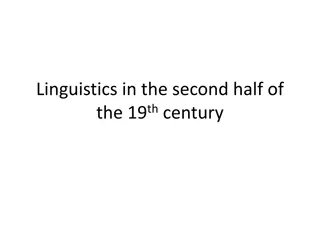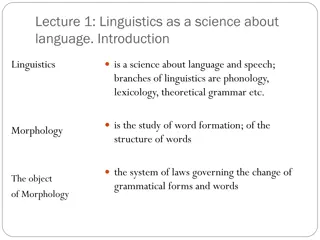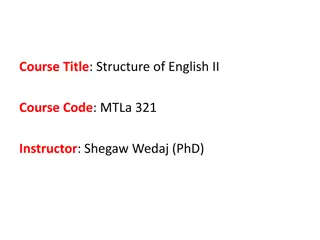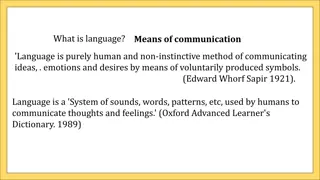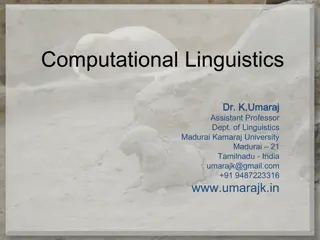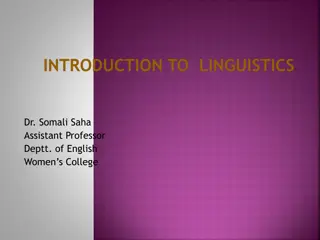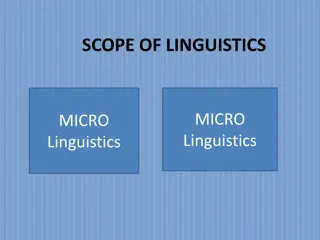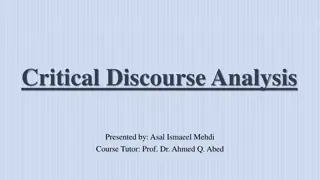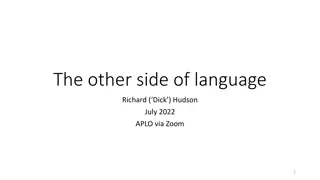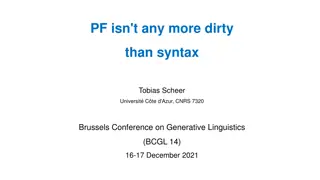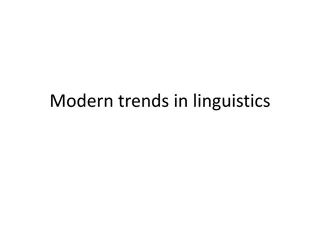Understanding Linguistics: An Overview of Language Study
Linguistics is the scientific study of human language systems, encompassing phonetics, syntax, semantics, phonology, pragmatics, and morphology. It explores how language functions, aids in language teaching, and facilitates error analysis. The scope of linguistics includes investigating sound systems, word structures, and sentence patterns across different speech communities.
Download Presentation

Please find below an Image/Link to download the presentation.
The content on the website is provided AS IS for your information and personal use only. It may not be sold, licensed, or shared on other websites without obtaining consent from the author. Download presentation by click this link. If you encounter any issues during the download, it is possible that the publisher has removed the file from their server.
E N D
Presentation Transcript
By M.R.Vijaya Bhaarathy, Assistant Professor of English Department Swami vivekanandha arts and science college ,vallam. thanjavur
LINGUIST One who studies language is a linguist. The linguist has to investigate how people speak and use language in a given speech community at a given time. He is concerned with identifying and describing the units and patterns of the sound system, the words and morphemes and the phrases and sentences.
LINGUISTICS The word linguistics has been derived from the two Latin words lingua which means tongue & istics which means knowledge. Linguistics is the systematic study of language. It is the study not of one particular language but of human language in general. Linguistics is defined as a scientific study of the systems / principles underlying human languages. It traditionally encompasses semantics, syntax & phonology. Greek philosophers in the 5 thcentury BC who debated the origins of human language were the first in the west to be concerned with linguistic theory
In the 1950s Noam Chomsky challenged the structuralise program, arguing that linguistics should study native speakers unconscious knowledge of their language, not the language they actually produce .It involves an analysis of language form, language meaning & also language context. This is a huge topic, though & different parts of it can be studied in different way for different reasons. David crystal in his encyclopaedia defines linguistics as science of language
IMPORTANCE OF LINGUISTICS In language teaching, linguistic knowledge can be transferred into class room teaching. Linguistics is concerned with discovery more and more about the way language functions. Language teachers teach students how to use a language. A teacher who is exposed to linguistics can face the problem of language teaching with greater confidence and efficiency than one who is not exposed to linguistics Most of the teachers are worried about the errors that their students make. The error analysts are concerned with the kinds of error and the ways of their remedy. A background in linguistics would be helpful to one who wants to do error analysis
SCOPE OF LINGUISTICS Phonetics Syntax Semantics Phonology Pragmatics Morphology
Phonetics: Phonetics is a branch of linguistics & it is the branch dealing with the medium of speech .It deals with the production, transmission & reception of the sounds of human speech.1stphoneticians were Indian scholars who tried to preserve the pronunciation of Sanskrit holy texts Modern phonetics began with Alexander Melvile Bell Three types of phonetics are Articulatory: study of how to speech sound made, Acoustic : study of the physical properties of a speech as sound wave Auditory: study of the perception of speech sounds
Phonology The word phonology derived from ancient greek . Study of sound pattern within language. It is one of the fundamental systems which a language is considered to comprise, like its syntax & its vocabulary. Commonly phonology belongs to theoretical linguistics. The history of phonology may be traced back to the Sanskrit in 4thcentury. Phonology is the study of the way sound function in language, including phonemes, syllable, structure, stress, accent, intonation & which sounds are distinctive units within a language. Commonly its derived into two types Diachronic phonology (Same sound, different spelling) Synchronic phonology (end with nt and dm )
Morphology The study of words is called morphology or morphemics. It was originally used in biology and only in the 19 thcentury it came to linguistics. It now means the study of morphemes which are the smallest grammatical units in the language. Especially in the consistent patterns of inflection, combination, derivation and change that may be observed and classified
MORPHEMES: It is the smallest meaningful unit of a language (example) the word dehumanization consists of four parts or units as de+human+iz+ation. Such units are called morphemes..Types of morpheme :1)Free morpheme, 2)bound morpheme
Free morphemes: Free morphemes are elements which can stand by themselves as single words. They cannot be broken down into grammatical parts. They have only base form which is called a ``root or ``strem Free morphemes fall into two categories .They are lexical and grammatical / functional morphemes Lexical morphemes: The set ordinary nouns, adjectives, verbs and adverbs which carry the content of messages we convey are lexical morphemes. (E.g) girl , man, house, lion, happy, short , white , etc....we can easily add new lexical morphemes to the language easily. So they are treated as open-class of words
Grammatical (or) functional morphemes GM or FM are functional / grammatical words in a language such as conjunctions, prepositions, articles, pronouns,& qualifiers.(e.g) and, but, when, because, or, near, above, in, the.that.if etc..we cannot add new functional morphemes to a language. So they are described as closed class of words Bound morphemes: It is one which cannot stand in its own. it always needs the support of a free morpheme. The morpheme ` ing in the word `eating is a bound morpheme .We cannot say I- ing . ` ing cannot occur on its own as a free form for which the sentences is meaningless
TYPES OF LINGUISTICS Sociolinguistics Psycho linguistics Anthropological linguistics ( ethnological linguistics) Neurolinguistics Computational linguistics Applied linguistics Historical linguistics Dialectology
Psycho linguistics: Psycholinguistics (or) psychology of language is the study of the relationships between linguistic behaviour and psychological processes, including the process of language acquisition. Psycholinguistics studies the mental processes like processes of thought, concept formation and their articulation in language. Psycholinguistics also studies the influence of psychological factors like intelligence, motivation, anxiety etc. A kind of mental disability is the cause for children making mistakes while reading. Psycholinguistics offers corrective measures for this condition. It deals with the learning of language of language at various stages and explains whether the human brain has an innate language ability. The study of psycholinguistics is very useful in the field of language teaching because it helps the teachers to understand error production and the individual difference among the learners so that they can frame a suitable syllabus for their level. So, language is logically ordered and rational. Just as irrationality is present in human language
Sociolinguistics Sociolinguistics deal with relation between language and society. The language as the communication tool and then the society is the communities of people. Sociolinguistic investigation is the language study within social context. The focus sociolinguistics is the effect of the society on the language. It studies how language varities differ between groups separated by certain social variables example.(religion,, status,, gender,, level of education,, age etc)
Anthropological linguistics Anthropological studies explore the relation between language and culture is invited to communicate and express a culture.The language determines the way the human being think and see the world. Anthropology is the study of humans and human behaviour and societies in the past and present. Social anthropology and cultural anthropology study the norms and values of societies. Linguistic anthropology studies how language affects social life.
Neurolinguistics Neurolinguistics is the study of the neural mechanisms in the humanbrain that control the comprehension, production, and acquisition of language. As an interdisciplinary field, neurolinguistics draws methods and theories from fields such as neuroscience, linguistics, cognitive science, communication disorders and neuropsychology. Neurolinguists study the physiological mechanisms by which the brain processes information related to language, and evaluate linguistic and psycholinguistic theories, using aphasiology, brain imaging, electrophysiology, and computer modelling.
Computational linguistics The branch of linguistics in which the techniques of computer science are applied to the analysis and synthesis of language and speech Applied linguistics: Applied linguistics is an interdisciplinary field of linguistics which identifies, investigates, and offers solutions to language-related real- life problems. Some of the academic fields related to applied linguistics are education, psychology, communication research, anthropology, and sociology Linguistics.
Historical linguistics Historical linguistics, also called diachronic linguistics, is the scientific study of language change over time. Principal concerns of historical linguistics include: to describe and account for observed changes in particular languages to reconstruct the pre-history of languages and to determine their relatedness, grouping them into language families(comparative linguistics) to develop general theories about how and why language changes to describe the history of speech communities to study the history of words, i.e. etymology
Dialectology Dialectology (from Greek , dialektos, "talk, dialect"; and - , -logia) is the scientific study of linguistic dialect, a sub-field of sociolinguistics. It studies variations in language based primarily on geographic distribution and their associated features. Dialectology is the study of the way sounds, words and grammatical forms vary within a language. The term is usually used to describe the study both of accents (the varying sounds used within a language) and dialects



